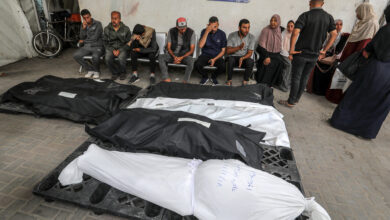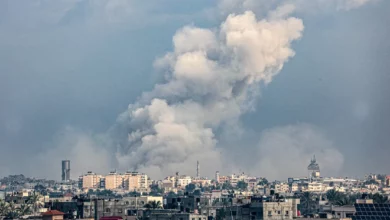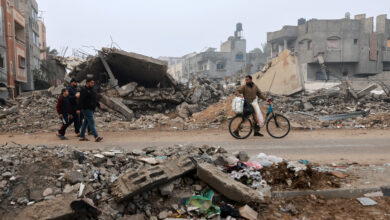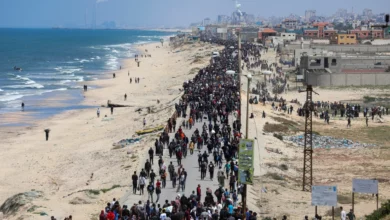The Egyptian authorities opened one side of the Rafah border crossing between Egypt and Gaza on Friday to allow Umra pilgrims coming from Saudi Arabia to return to Gaza, an official source told Al-Masry Al-Youm.
The source did not specify how long the crossing would be open.
Al-Masry Al-Youm reported that Cairo International Airport security head Salah Zeyada held a meeting with Major General Magdy al-Samman, head of the airport passports authority, to prepare to receive hundreds of Palestinian pilgrims who were trapped in a number of countries following the closing of the crossing.
The pilgrims will be allowed to cross into Gaza through Rafah in cooperation with the Palestinian Embassy in Cairo, an airport security source told Al-Masry Al-Youm.
The source added that an additional number of immigration officers would receive the Palestinian pilgrims in order to complete the entry process as quickly as possible, then a number of cars would be waiting outside the airport to take the pilgrims to Rafah.
The head of the Hamas government in Gaza had urged Egypt on Thursday to open the vital border crossing, closed since gunmen killed 16 Egyptian guards in neighboring Sinai on Sunday, Reuters reported.
Ismail Haniyeh pledged his support for Egypt's investigations of the attack, which has led to the biggest Egyptian military assault in the Sinai Peninsula in nearly 40 years.
"At the same time I call upon my brother, Egyptian President Mohamed Morsy to open the Rafah crossing, to regain a lifeline for Gaza," Haniyeh said at a dinner ending the daylong Ramadan fast.
"Gaza could never be anything but a source of stability for Egypt," Haniyeh added, saying those responsible for the Sinai slayings were conspiring to tighten an Israeli blockade on Gaza in force since Hamas seized control of the territory in 2007.
Gaza's Islamist rulers have ruled out suggestions that Palestinian gunmen took part in the Sinai massacre, and have criticized Cairo for imposing "collective punishment" on the impoverished coastal enclave.
The Rafah crossing normally sees some 800 people a day leave for Egypt and beyond, and is the only window on the world for the vast majority of Gazans.
The Hamas Interior Ministry in Gaza said Egypt had agreed to a limited reopening of the border, which would permit hundreds of Gaza residents stranded in Sinai to cross back into the coastal territory on Friday. But nobody would be permitted to reach Egypt from Gaza.
"The Rafah crossing will be open on Friday for returnees," the statement said.
No one has claimed responsibility for Sunday's assault, in which the assailants seized two armored vehicles to storm an Israeli border crossing. One made it through before the attackers were killed by Israeli fire. The incident was the deadliest along the Israeli-Sinai border in decades.
In addition to challenging the durability of a 1979 Israeli-Egyptian peace treaty already strained by Western ally Hosni Mubarak's fall from power last year, the violence also raised questions about ties between Egypt's nascent Muslim Brotherhood-led government and Hamas in Gaza.
Egyptian officials suggested initially that Palestinian gunmen were involved in the Sinai attack.
Haniyeh denied this, arguing that the attack's "prime beneficiary was the occupation," a common shorthand for Israel by Hamas officials whose ideology rejects Israel's existence as a Jewish state.
"Gaza is innocent of this crime. Neither our investigations nor our contacts have proven so far anyone from Gaza was involved," Haniyeh said.




